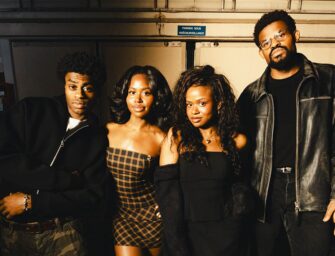Inspired by the daily struggles facing real people in small-town America, we learn all about this rootsy slice of Americana
What is songwriting if not a reflection of life through music, a filter to process the people and places that shape us as humans. Since his 2013 debut, Whisper In The Dark, Americana/roots musician Garrett Heath has been sharing his own observations, often drawing from his hometown in rural Pennsylvania. His upcoming album, The Losing End, takes that approach one step further and brings together stories of economic decline, socio-political abandonment, and the subtle beauty of daily life in often ignored parts of America.
At the heart of the album is its title track. Playing like a collection of short stories that combine to make a compelling ode to those who have seemingly been left behind by the modern world. It’s also exactly the kind of song that we’re desperate to learn more about, so it’s over to Heath to do just that…
More ‘Song Deconstructed’ features
INSPIRATION
The Losing End was inspired by real people in small-town America and the economically abandoned places I grew up in and call home. Many of the industries that put our region on the map have left in the past several decades, leaving behind a general lack of personal and vocational opportunities.
The song unfolds as a series of short vignettes, each focusing on a unique perspective of daily life in rural America, and each conveying a sense of what it feels like to be left behind by the modern American socio/economic/political complex.
Many of these little stories are inspired by real people that I know from my hometown. The song takes on that all-too-common feeling in Rust Belt America that our best days are behind us, that my life doesn’t really count anymore, that even my own personal victories are somehow a loss on the national scale.

Garrett Heath: “Behind the lyrics, a musical tension exists throughout the song.”
LYRICS
“We’re all coming out on the losing end.” The closing line is quite literal, as are the short vignettes throughout the song. But it represents an entire shared mentality across a whole swath of people in Rust Belt America, whose daily grind never really amounts to any kind of victory.
The verses each feature a particular person: a blue-collar worker, a grocery store owner, a high-school coach, and a little girl. All must face a daily reality of being dealt a bad hand and a life of hard work that is likely overshadowed by socio-economic powers outside of their control.
MUSIC
The real musical challenge with this song was to find the sound that would best tell these stories. In the end, a unique combination of American folk, roots, rock, and blues inspiration came together in the studio to form an “Appalachian Roots/Rock” sort of sound that provided a unique backdrop for these stories. I really feel like this record is musically a product of the particular place I call home, and I hope listeners can feel the sense of rural locality and authenticity.
Behind the lyrics, a musical tension exists throughout the song. The vibe is overall very melancholic but still feels a bit like an anthem (if such a thing exists in roots/rock music). The vocal is bleak and a bit unsettling, while the guitars and organ provide a more hopeful musicality. I think that somehow subconsciously found its way into the production. The real point of the record is that the situation may indeed be dire or bleak, yet this is my life and the place I’ve chosen to carve out my little niche; therefore, I’m going to do everything possible to make the most of it.

Garrett Heath: “The verses each feature a particular person: a blue-collar worker, a grocery store owner, a high-school coach, and a little girl.”
IN THE STUDIO
I produced and recorded this record myself at Okiejoke Sound, the home studio I built and opened up here just last year. I’ve got an API recording console with a rack of analog gear blended with a state-of-the-art digital setup where I can sort of use a hybrid “best of both worlds” workflow for tracking and mixing.
I felt this song, and the album as a whole, required a somewhat “timeless” feel, as these stories span the course of five decades in my hometown in rural western Pennsylvania. So I brought in old analog outboard gear, vintage guitar amps, instruments, and some cool old ribbon microphones. An Ampex tape-delay was used on the vocal, pushed pretty hard to clipping. All of these production strategies were intentional in conveying a story that covers several decades and generations.
FINAL THOUGHTS
The Losing End is a very personal song, and it’s both lyrically and musically vulnerable. These are the people I call my family and friends; these are the places I call home. I hope listeners really walk away with a sense of both the beauty and desperation of daily life in these mostly forgotten parts of the country.
The Losing End is out now, with the album of the same name following later this year. For music, news and tour info, check out garrettheathofficial.com
More ‘Song Deconstructed’ features






![Interview: Jessie Jo Dillon [2025]](https://www.songwritingmagazine.co.uk/wp-content/uploads/jessie-jo-dillon-2-by-libby-danforth-335x256.jpg)

























Related Articles